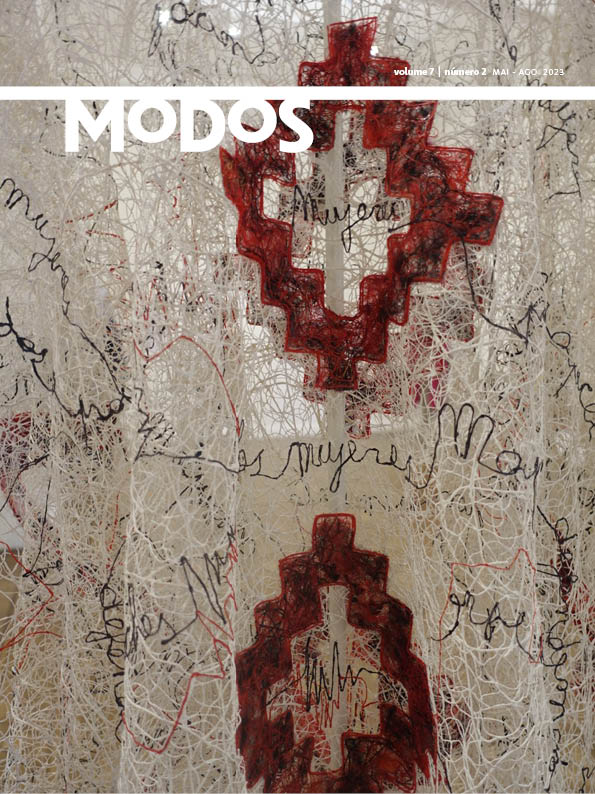Abstract
By problematizing the rhetoric of separation associated with the term feminism in the discourse of some Portuguese women artists, this text seeks to explore the strategies developed by women artists in Portugal in the 1970s to assert their agency in the cultural sphere. These strategies, which could perhaps be understood as strategies of non-separation, should be apprehended in the light of the Portuguese political, social and cultural history of those years, clearly distinguishing themselves from feminist-oriented strategies of intervention developed by women artists in the same period in other geographies, and more particularly in the Anglo-Saxon context – a context that, in this field of studies, has become an important reference.
References
ABSOLVIÇÃO para as ‘Novas Cartas Portuguesas’. O juiz mandou em paz três Marias de cravo ao peito. Diário de Lisboa, Lisboa, p.17, 8 maio 1974.
AMARAL, A. L. Breve introdução. In: BARRENO, M. I.; HORTA, M. T.; COSTA, M. V. da. Nova Cartas Portuguesas. Alfragide: Dom Quixote, 2010, p. XV-XXVI.
ARTISTAS PORTUGUESAS. Lisboa: Sociedade Nacional de Belas Artes, 1977. Catálogo de exposição.
AS TRÊS AUTORAS das ‘Novas Cartas’ e o momento político. Diário de Lisboa, Lisboa, p. 10, 9 maio 1974.
BEAUVOIR, S. de. Entrevista, RTP Arquivos, recurso on-line, 30/04/1975a. Disponível em: https://arquivos.rtp.pt/conteudos/simone-de-beauvoir/. Acesso em: 19 set. 2022.
BEAUVOIR, S. de. Sartre et le Portugal. Les femmes et les étudiants. Libération, Paris, p.4-5, 23 abr. 1975b.
CABRAL, M. V. Texto e imagem fotográfica no primeiro contra-discurso durante o Estado Novo: ‘As mulheres do meu país’ de Maria Lamas. Comunicação Pública, Lisboa, v.12, n. 23, p.1-27, 2017. Disponível em: https://journals.ipl.pt/cpublica/article/view/162. Acesso em: 3 out. 2022.
DIALOGUE: Féminie 79. Paris: UNESCO, 1979. Catalogo de exposição.
DUMONT, F. À l’assaut ! Explosion d’expositions de femmes artistes en France pendant le mouvement féministe. Artl@s Bulletin, v. 8, n. 1, p.255-266, spring 2019. Disponível em:https://docs.lib.purdue.edu/cgi/viewcontent.cgi?article=1184&context=artlas. Acesso em: 12 set. 2022.
FERREIRA, V. Engendering Portugal: Social Change, State Politics and Women’s Social Mobilization. In: PINTO, A. C. (Ed.). Contemporary Portugal: Politics, Society and Culture. 2nd Editions. Boulder: Social Science Monographs, 2011, p. 153-192.
GONÇALVES, A. Tapeçaria Contemporânea Portuguesa (1969-2002) Antecedentes e Protagonistas do século XX. 2015. Dissertação (Mestrado em Ciências da Arte e do Património)-Faculdade de Belas Artes, Universidade de Lisboa, 2015.
HATHERLY, A. Éditorial. Plages, Paris, p.3, dez. 1981.
HATHERLY, A. Lisbonne, mai 1979. In: Dialogue: Féminie 79. Paris: UNESCO, 1979. Catálogo de exposição.
LAMONI, G. A Liberating Impulse? The Exhibition Liberation: 14 American Artists in Lisbon in 1977. Comunicação apresentada no colóquio Hot Art, Cold War: US Art and Portugal, 1945-1990. Lisboa: Fundação Gulbenkian, 27-28 Abril 2022, não publicado.
MADEIRA, C. Elisabete Mileu: ‘exposição’ e performance do corpo nu. Sinais de Cena II, Lisboa, n. 4, p. 200-218, 2020a.
MADEIRA, C. Arte da Performance ‘Made in Portugal’: uma aproximação à(s) história(s) da arte da performance portuguesa. Lisboa: ICNova, Universidade Nova de Lisboa, 2020b.
MONTEIRO, C. M. da S. Simone de Beauvoir e Portugal. 2004. Dissertação (Mestrado em Estudos Franceses)-Universidade de Aveiro, 2004.
NEVES, J. O País das Mulheres de Maria Lamas. Nova Síntese, Coimbra, n.2-3, p. 183-194, 2007-2008.
OLIVEIRA, L. Performing Revolution: Women’s Artistic Agency and Democratization in Portugal (1974–79). Portuguese Studies, v. 38, n. 1, p.62-77, 2022.
OLIVEIRA, L. Portuguese Artists in London: Shaping Identities in Post-War Europe. London: Routledge, 2019.
OLIVEIRA, M. Portuguese Women Artists at the National Society of Fine Arts. Why Was This not a Feminist Exhibition? In: JAKUBOWSKA, A.; DEEPWELL, K. (Eds.). All-Women Art Spaces in Europe in the Long 1970s. Liverpool: Liverpool University Press, 2018, p.209-228.
OLIVEIRA, M. Arte e Feminismo em Portugal no contexto pós-Revolução. Vila Nova de Famalicão: Editora Húmus, 2015.
PINTASILGO, M. de J. Portugal, Daring to be Different. In: MORGAN, R.(Ed.). Sisterhood is Global: The International Women’s Movement Anthology. New York: The Feminist Press at CUNY, 1984, p. 571- 575.
RATO, V. O paradoxo português. Público, 11 set. 2005. Disponível em: https://www.publico.pt/2005/09/11/jornal/o-paradoxo-portugues-38224. Acesso em: 25 jan. 2023.
TAVARES, M. Feminismos em Portugal (1947-2007). 2008. Tese (Doutoramento em Estudos sobre as Mulheres, Especialidade em História das Mulheres e do Género)- Universidade Aberta, Lisboa, 2008. Disponível em: https://repositorioaberto.uab.pt/bitstream/10400.2/1346/1/Tese%20de%20doutoramento%20Manuela%20TavaresVF.pdf. Acesso em: 12 set. 2022.
TAVARES, S. Artistas Portuguesas. Lisboa: Sociedade Nacional de Belas Artes, 1977. Catálogo de exposição.
VICENTE, F. L. A arte sem história: mulheres e cultura artística (séculos XVI-XX). Lisboa: Athena, 2012.

This work is licensed under a Creative Commons Attribution-NonCommercial-ShareAlike 4.0 International License.
Copyright (c) 2023 Giulia Lamoni

